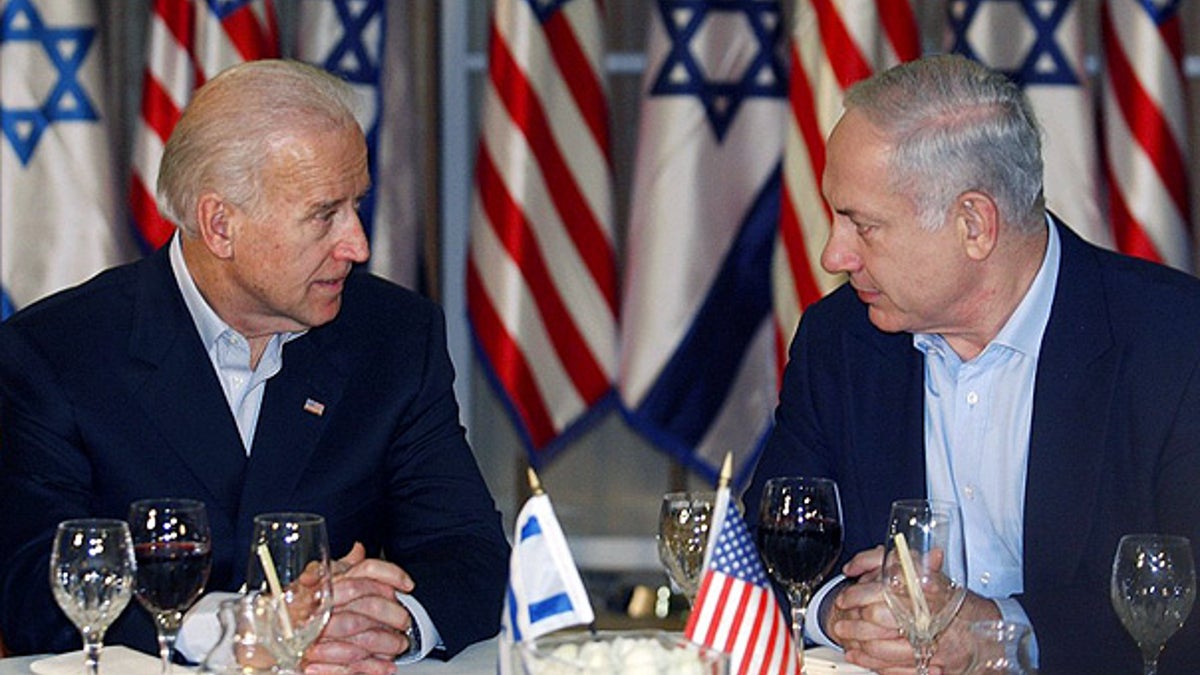
Mar. 9: Vice President Joe Biden sits with Israeli Prime Minister Benjamin Netanyahu before a dinner in Jerusalem. (Reuters)
U.S.-Israeli relations have hit a 35-year low over a contentious east Jerusalem building project that threatens to derail peacemaking efforts with the Palestinians, Israel's envoy to Washington was quoted as saying Monday.
Ambassador Michael Oren's remarks clashed with Prime Minister Benjamin Netanyahu's assurances that the political turmoil resulting from the settlement announcement, which the Obama administration slammed as "an insult," was under control.
"Israel's ties with the United States are in their worst crisis since 1975 ... a crisis of historic proportions," the Yedioth Ahronoth newspaper quoted Oren as saying to Israeli diplomats in a phone briefing over the weekend.
Israeli officials said that the U.S. is pressing the Jewish nation to scrap the east Jerusalem building project.
Competing Israeli and Palestinian claims to east Jerusalem were feeding tensions in the holy city, where Arabs and Jews maintain an uneasy coexistence and sometimes clash. Police were out in large numbers in the volatile Old City in expectation of renewed clashes
Top U.S. officials have lined up in recent days to condemn the Israeli plan to build 1,600 apartments in east Jerusalem, the sector of the holy city that the Palestinians claim for their future capital.
The project caused a storm in Washington because it was announced during Vice President Joe Biden's visit to the region last week, badly embarrassing the U.S. and complicating its efforts to restart Israeli-Palestinian peacemaking. The Palestinians immediately threatened not to join upcoming U.S.-brokered talks meant to jumpstart negotiations after a 14-month breakdown.
U.S. officials have not disclosed what steps they want Israel to take to ease the crisis, and Israeli government spokesman Mark Regev refused to comment Monday. But Israeli newspapers and radio stations said Washington wants the construction project canceled.
They also reported that the U.S. wants Israel to make a significant confidence-building gesture toward the Palestinians. Suggestions included releasing hundreds of Palestinian prisoners held in Israeli jails; turning over additional areas of the West Bank to Palestinian control; removing some of the roadblocks hampering the movement of Palestinians and goods in the West Bank; and easing the blockade on the Hamas-ruled Gaza Strip, media reported.
Washington, they added, also has demanded that Israel officially declare that talks with the Palestinians will deal with all the conflict's big issues, including final borders, the status of Jerusalem, and the fate of Palestinian refugees who fled or were driven from their homes during the war that followed Israel's 1948 creation.
The unusually harsh U.S. criticism has undercut Israeli Prime Minister Benjamin Netanyahu's efforts to suggest that the crisis had passed. Israeli newspapers reported Monday that Israel's ambassador to Washington, Michael Oren, told Israeli diplomats in a conference call Saturday night that their country's relations with the U.S. haven't been so tense since 1975.
The Foreign Ministry had no immediate comment.
East Jerusalem, home to Muslim and Jewish holy sites, historically has been the most explosive issue dividing Israelis and Palestinians. Israel annexed the territory after capturing it in the 1967 Mideast war but the Palestinians and the international community have not recognized that move and consider the Jewish neighborhoods Israel has built there to be illegal settlements.
Although previous Israeli leaders have agreed to the principle of sharing the disputed holy city, Netanyahu objects to partitioning Jerusalem and wants to keep the city united under Israeli control.
He also exempted east Jerusalem from a November order limiting settlement construction for 10 months. The order, issued under intense U.S. pressure, applies only to the West Bank.
The Palestinians want the West Bank, east Jerusalem and the Hamas-ruled Gaza Strip to be part of their hoped-for state.
The Associated Press and Reuters contributed to this report.




